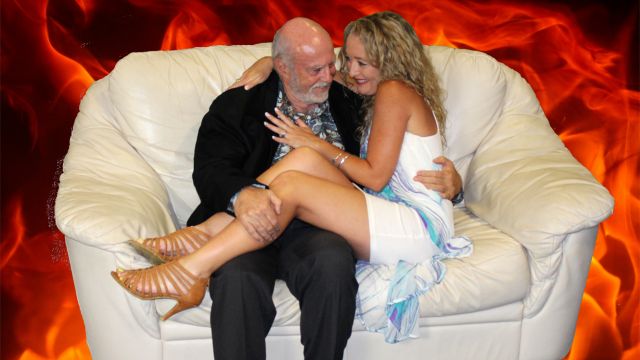When Dad Married Fury
It's always refreshing to see contemporary Australian plays being produced in community theatre – and while David Williamson's work is reliably witty, satirical and thought provoking – this piece is possibly one of his darker efforts.
Set smack bang in the middle of the 2008 Global Financial Crisis, the story centres around two brothers (Ian and Ben), the sons of an ageing millionaire – who become insecure about their potential inheritances when Dad remarries a much younger, American woman – who originally hails from the very buckle of the Bible Belt.
The family have been gathered together for dad's 75th Birthday and to meet this presumed gold-digger, when things are further complicated due to Ben's father-in-law committing suicide as a direct result of being swindled by his father. Needless to say Ben's grieving wife Laura is hardly thrilled to be attending this little family re-union. Cue a barrage of bitter diatribes and perfectly-worded insults.
 While this is a still a quintessentially Australian family, its members are arch characters of the most self-centred and capitalistic kind.
While this is a still a quintessentially Australian family, its members are arch characters of the most self-centred and capitalistic kind.
Terry Collin's use of a minimalist, multi-level, monochromatic set serves not only to highlight the use of slide projections to expedite scene changes – they also afford her talented ensemble cast all the more room in which to chew the scenery as skilfully as they do.
Andy Kabanoff is deliciously vile in the demanding role of Alan, the family patriarch with the heart of stone. Steve Pearson and Rowan Cowley bounce off each other nicely as the hapless brothers being manipulated throughout the piece while Louise Sullivan's commanding presence as the ultra-bitter Laura is well matched by Susannah Bonnor's uber-snob as Ian's missus. Kellie Martin is note-perfect in the eponymous role of Fury - a red-neck with the heart of gold.
The relentlessly vitriolic script is broken up by the sensitive cameo appearances of Annie Bilton as the grieving widow. Her emotional face-off with Alan over the death of her husband (towards the end of Act II) is truly gut-churning. It is at this point that the play turns from 'black comedy' to gritty drama.
While the King Lear-esque echoes are obvious – there are a few twists and turns in this plot - but this is definitely no 'Don's Party'.
Rose Cooper
Photographer: David Wicks

Subscribe to our E-Newsletter, buy our latest print edition or find a Performing Arts book at Book Nook.

